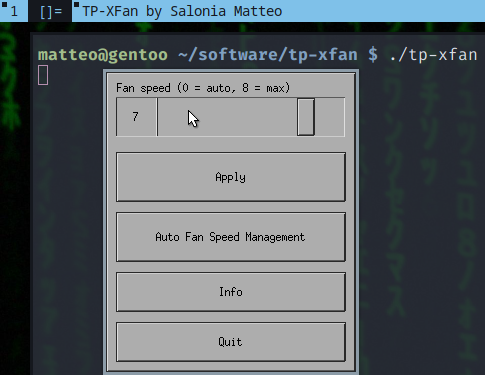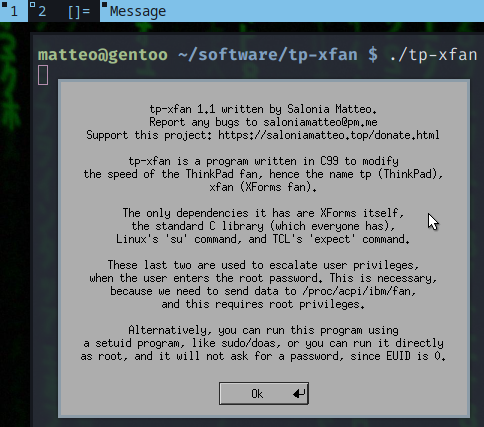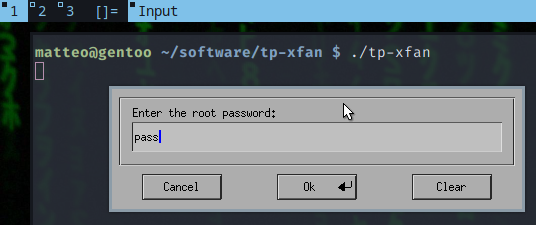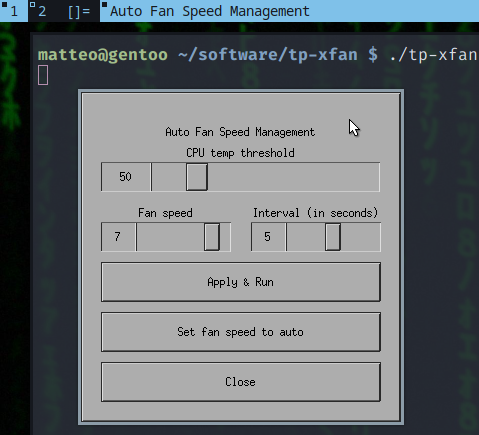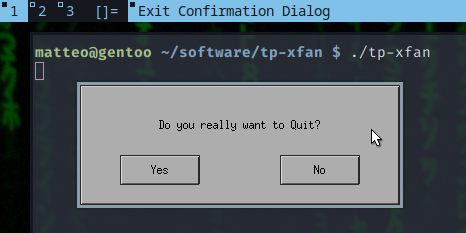tp-xfan is a simple program written in C which lets users with
any ThinkPad (that has ACPI fan support) modify their fan's speed,
going from 0 (auto), to a maximum of 8 (disengaged).
It also features an intuitive yet nostalgic Graphical User Interface, written using XForms (hence the name, XForms Fan).
For more features, check Features.
For a list of changes and/or news, check the NEWS
and ChangeLog files.
Initially written on May 28, 2021.
Current version can be found in tp-xfan.c under src/,
or by running make version (see Installation)
If you plan to work on tp-xfan, be sure to read INDENTATION.
Support this project: salonia.it/donate
Currently, tp-xfan supports the following command-line flags:
| Flag | Argument | Description |
|---|---|---|
-d |
None | Enable Debugging |
-i |
None | Print program info and exit (No XForms required) |
-h |
None | Print help and exit |
-p |
Required | Use a custom path for the apply.sh script |
-v |
None | Be more verbose |
tp-xfan has a lot of powerful features, including:
- Value Slider to choose values
- Setting a custom directory for the apply.sh script,
in case you don't have it in your current directory,
nor under
/usr/local/share/tp-xfan. - AFSM (Automatic Fan Speed Management); See AFSM.
- Automatic recognition of root & non-root users
- When running as root, no password is required, and the command is executed immediately, if the apply.sh script was found.
- When running as a non-root user, the root
password is asked (but not stored anywhere),
in order to access
/proc/acpi/ibm/fan. - When running as a non-root user with
a setuid program (like sudo/doas), no
password is required from
tp-xfan.
- Local Password Caching: the password is stored in a
variable, which will only be accessible by
tp-xfanitself. - Debugging functionalities, to see what
tp-xfanreally is doing even when you cannot see it. - Verbosity, to see if the command to set the fan speed actually worked or not.
Note that Debugging and Verbosity only output to the console.
Automatic Fan Speed Management (or AFSM) is a very powerful
feature of tp-xfan. It allows users to choose a CPU temperature
threshold, the speed of the fan, and the interval (in seconds).
For example, with a given threshold temperature of 50°C, AFSM will start the fan after the seconds provided by the interval, with the speed chosen by the user.
So, every interval seconds, AFSM will check if the current CPU temperature is above the threshold: if it is, it will keep going, setting the fan to the speed chosen by the user; if the temperature is below, or equal to the threshold, it will immediately set the fan speed to 0 (auto), and it will cycle forever.
Start Menu: the initial screen, shown when tp-xfan is opened.
Info Screen: showing info.
Password Screen: tp-xfan is asking the root password.
AFSM Screen: Auto Fan Speed Management screen.
Exit Confirm: tp-xfan is asking the user if they really want to exit.
In order to run tp-xfan, you need the following packages:
xforms(required): provides the core Forms functionality. (Gentoo: x11-libs/xforms, others: http://xforms-toolkit.org)expect(optional): used for escalating privileges, when not running as root. (Gentoo: dev-tcltk/expect)- Linux's
su(optional): used for escalating privileges, when not running as root. Guaranteed to be present on a fully working Linux system.
Also, you need to have the thinkpad_acpi module.
If you build your Kernel yourself, make sure the following are enabled:
Device Drivers --->
[*] X86 Platform Specific Device Drivers --->
<M> ThinkPad ACPI Laptop Extras
Then, make sure the driver is available:
lsmod | grep thinkpad_acpi
Then, write the following to /etc/modprobe.d/thinkpad.conf:
options thinkpad_acpi fan_control=1
Now, you should reboot. After rebooting, you should be able to modify your ThinkPad's fan speed.
(See Requirements)
tp-xfan uses GNU AutoTools to increase its portabilty and flexibility.
Normally, users should run the following commands, to install tp-xfan:
./configure
make
# the following should be ran as root,
# or by prepending "sudo" or "doas".
make install install-dataThis will install tp-xfan, and the default apply.sh script (/usr/local/share/tp-xfan/apply.sh)
If, for some reason, you cannot run the commands above, run autoreconf --install, then retry.
If you need help, you can:
- Create an issue;
- Open a pull request;
- Send me an email (saloniamatteo@pm.me or matteo@salonia.it).
